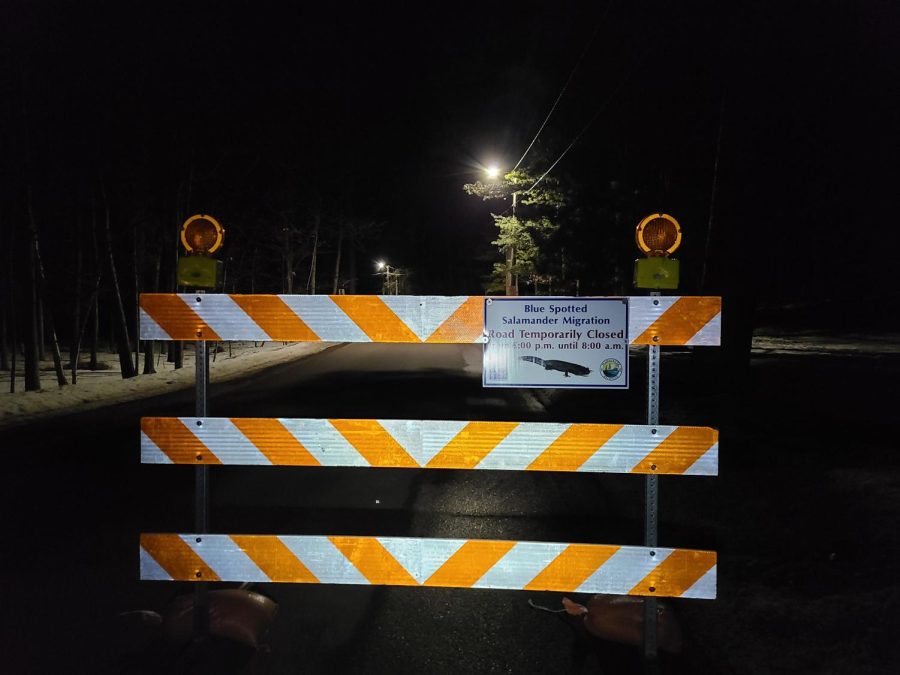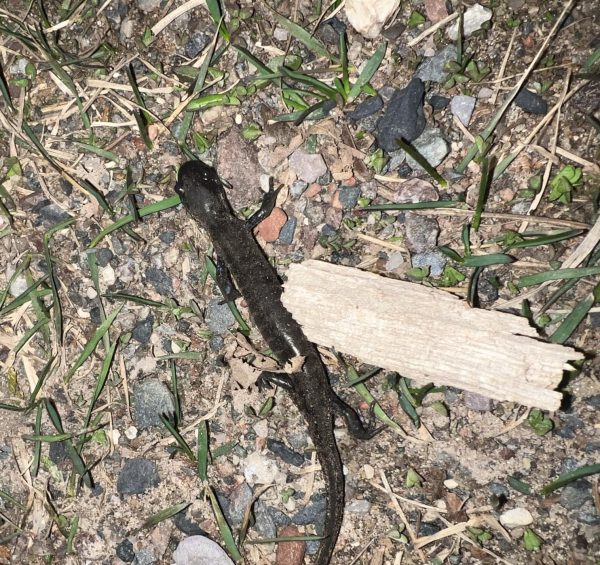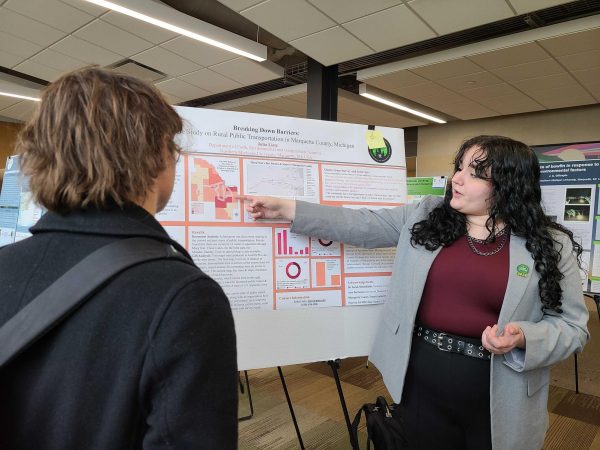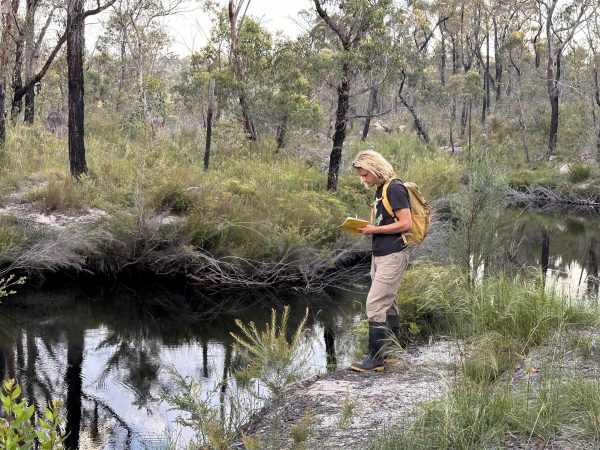Saving the salamanders
Presque Isle road temporarily closes to allow blue-spotted salamanders to cross unharmed
NIGHT CROSSING — A section of the Peter White Road is seasonally closed off at night to protect the blue-spotted salamanders who migrate to the wetlands to breed in the spring. This road closure was first introduced by an NMU student who started a research project when he noticed salamanders were being crushed by passing cars.
March 24, 2022
Eli Bieri first noticed the blue-spotted salamanders on Presque Isle during his freshman year in the spring of 2018. A lover of amphibians, when Bieri was informed of the salamander migration from a master’s student, he knew he had to check it out.
“I was shocked to see thousands of salamanders crossing the road,” Bieri said. “I’d spent my life chasing amphibians and never seen anything like it.”
Bieri not only witnessed the migration of the blue-spotted salamanders, but he also saw hundreds of them get squished by cars driving through the park at night.
“When I noticed that cars were driving through and squishing salamanders, I wondered how many were being hit and if cars were negatively affecting their population,” Bieri said.
He wanted to test out this theory and teamed up with professor Jill Leonard from the biology department in 2019 to draft a research proposal looking at the effect of cars on the blue-spotted salamander population. The project received grants from the Society for the Study of Amphibians and Reptiles, the Chicago Herpetological Society and other community members.
“Seeing the Marquette community become excited about amphibians right in our backyard was equally as amazing,” Bieri said.
A research group composed of Bieri, numerous other students and community volunteers counted 429 killed salamanders over the course of the research project and used visual implant elastomer tags to mark some of the migrating salamanders to estimate the total number of salamanders.
“The biggest challenge in the research was balancing cold and wet sleepless nights of counting salamanders with student responsibilities,” Bieri said. “My favorite aspect was getting to know the habits of the salamanders better, watching a salamander climb over a snowbank will never cease to amaze me.”
Bieri worked with the City of Marquette to initiate the temporary road closure at Presque Isle Park and continued to look for killed salamanders the following year. During the salamander migration with the closed road, the rate of salamander mortality fell from 10 to 20% to less than 1%, according to Tyler Penrod from the Superior Watershed Partnership.
The Superior Watershed Partnership and the City of Marquette have continued to seasonally close off the section of Peter White Drive where the migrating salamanders cross ever since Bieri’s research project.
“Sometimes we can see hundreds or even thousands of salamanders cross in just a short period of time,” Penrod said. “So it’s important not to have cars and bikes driving through and squishing them.”
This year, the road closure will be in place from March 15 to April 30 from 8 p.m. to 8 a.m. This partial road closure protects the blue-spotted salamanders while they migrate to the wetlands where they reproduce and then as they migrate back to various areas around the U.P.
“Presque Isle Park is a really unique place. It’s a really highly forested, well-protected part of the City of Marquette,” Penrod said. “You can think of the blue-spotted salamander as having populations polka-dotted around the Upper Peninsula and this is one of those spots where they thrive.”
The protection of these salamanders is especially important since Bieri discovered a special all-female subset of the salamander population that has a unique reproduction process.
“I got in touch with an amphibian geneticist who determined they are the U.P.’s only unisexual polyploid salamander population,” Bieri said. “They are an all-female line with extra sets of chromosomes that clone themselves in a process known as parthenogenesis. It’s a truly bizarre phenomenon and further demonstrates the need to protect this unique population.”
The City of Marquette has facilitated this temporary road closure to protect the salamanders since Bieri’s project in 2019, garnering interest and support from the Marquette community.
Organizations such as the Peter White Public Library, Marquette Arts & Culture Center and Moosewood Nature Center are hosting artistic and educational events to celebrate the blue-spotted salamander migration. These special events are part of the City of Marquette’s Salamander Days Events and can be found in more detail at MQTcompass.com.
“I guess last year was a big year where before then, people who knew about the migration would go check it out but those were just a handful of folks. But we’re in a small community where that spreads like wildfire,” Penrod said. “Last year we’d see parking lots filled late at night in the dark with parents bringing their kids out to take a look and college students going out to see this really neat spectacle.”
For people interested in watching the salamander migration, Penrod asks that people be mindful of the park rules including parking in designated areas, not bringing dogs or bikes into the park, picking up all trash and staying on the pavement. He also recommends bringing a flashlight and being mindful of where you step so as not to crush any of the salamanders.
“We just ask that people be respectful and understand that these are wild creatures that are interacting with the environment in the natural way,” Penrod said. “So not picking them up and holding them is a good way to just let them continue on their journey.”
While the road closure is a great temporary solution for the salamanders, Bieri says a more long-term solution would be constructing a series of underground tunnels known as ‘ecopasses’ that have effectively helped migrating amphibians in other communities.
“The road closure is a fantastic temporary solution, but closing the road is labor-intensive and timing the migration can be tricky,” Bieri said. “Now the challenge is finding support and funding for the [ecopasses,] but the enthusiasm I’ve already seen from the Marquette community gives me confidence.”

































